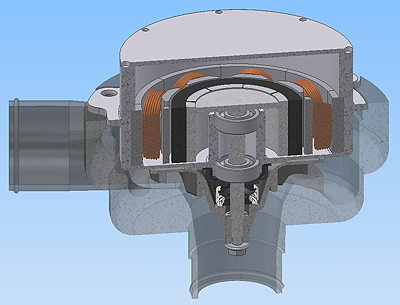The researchers, from the University of Adelaide, are working with an industrial partner, Intelligent Electric Motor Solutions (IEMS). They have used two emerging magnetic materials – soft magnetic composite (SMC) and amorphous magnetic material (AMM) – combined with novel production techniques, to form stators suitable for use in motors or generators.
The SMC material consists of iron powder that can be pressed easily into any required shape. It is said to simplify manufacturing and to offer improved design flexibility. The technology can be scaled easily to higher output powers.
“Currently all commercial motors are made by pressing very thin metal sheets of silicon iron together and then stamping out the shape of the stator from the metal,” explains the lead researcher, associate professor Nesimi Ertugrul from the University’s School of Electrical and Electronic Engineering. “This process is wasteful of the metal sheeting, and also limits the best use of available space for the copper wire needed in motors.
“We’ve produced new stators using SMC with no need for machining, no scrap metal and improved space utilisation for copper wire for greater power output,” he adds.
The researchers have developed and patented prototype small motors, using both the SMC and AMM technologies. They say that these machines are achieving energy efficiencies of up to 90%.
The first project resulted in a 2kW motor based on soft magnetic composites. IEMS designed and specified the SMC elements, while the University built a computer-controlled four-quadrant dynamometer testbed using an inline torque transducer.

A cutaway view of a water pump powered by the SMC-based motor technology developed in Australia
The SMC-based motors operate at low speeds with high power outputs. Their production costs are expected to be low, and they are aimed at general-purpose applications such as swimming pool pumps.
The research has been funded through two grants from the Australian Research Council. The researchers are now looking for further investment partners to commercialise the technology.
The University researchers are also working with IEMS to develop a low-cost micro wind turbine generator based on the SMC materials. They say that this machine will have a high power density and low cogging torque.
• IEMS has joined forces with Isis Innovation, the technology transfer company of the University of Oxford, to help find international commercialisation partners and/or investment in Asia and Europe. IEMS CEO David Gehlert says that Isis has “a strong presence in promoting new and exciting technologies, and an excellent track record in bringing high-tech products and distribution partners together”. In 2009, Isis spun the Yasa (yokeless and segmented armature) motor technology, developed at Oxford University, into a separate company.

